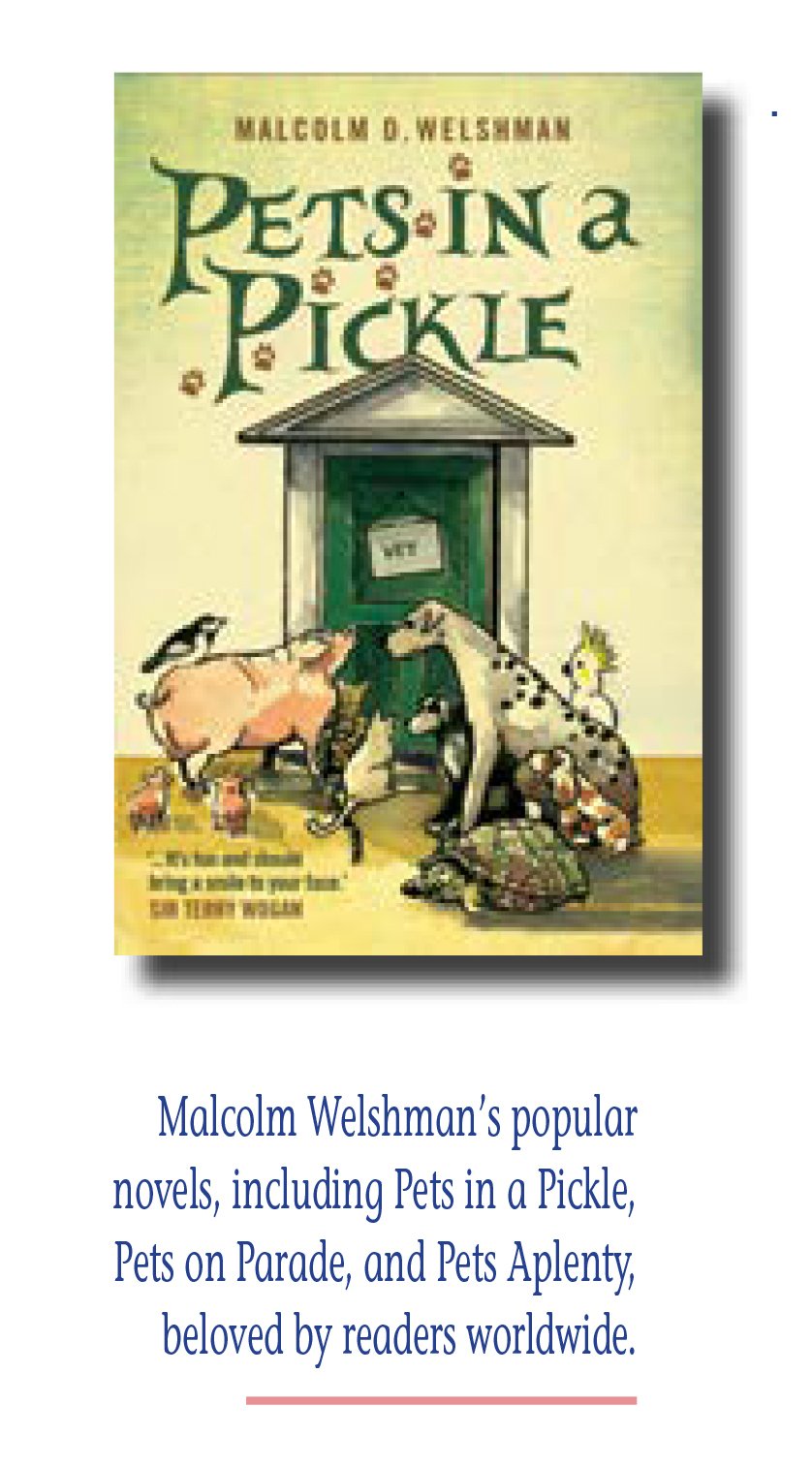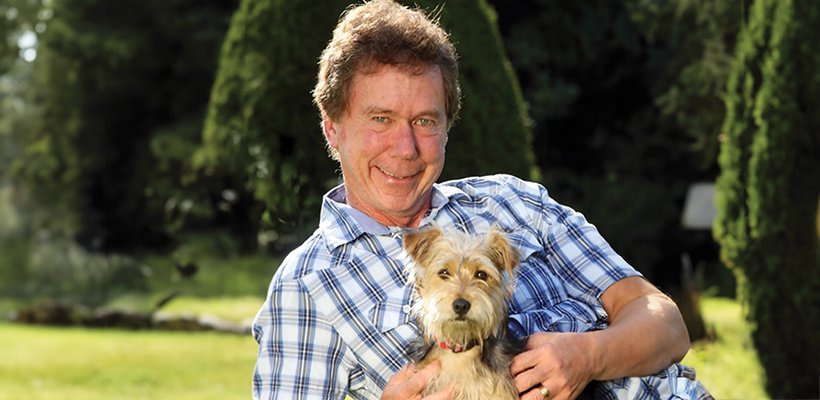From London Zoo to Amazon’s Bestseller List: Combining Veterinary Practice with Writing
Malcolm Welshman discusses his veterinary career, transition to bestselling author, and experiences as a cruise ship speaker, offering advice for aspiring writers.
Malcolm Welshman, a retired veterinarian and accomplished author, has led a life rich with remarkable experiences and fascinating encounters with animals. From his early days in Nigeria, where his passion for wildlife was ignited, to his tenure at London Zoo and his subsequent career in veterinary practice, Welshman’s journey is as diverse as it is inspiring. His literary career took off with the publication of his debut novel, Pets in a Pickle, in 2011, which quickly became a bestseller on Amazon Kindle. This success paved the way for sequels like Pets on Parad and Pets Aplenty, charming readers with humorous and heart-warming tales.
In addition to his novels, Welshman is a prolific writer for national magazines and has contributed features to prominent publications such as the Daily Mail and the Sunday Times. His storytelling prowess extends to his memoir, An Armful of Animals, which recounts his unforgettable encounters with a variety of creatures. Welshman’s vibrant narrative style brings to life the myriad of experiences he has had, whether they occurred in the wilds of Africa or the corridors of a veterinary hospital.
Welshman’s career is not limited to writing; he is also a sought-after guest speaker on cruise ships, sharing his wealth of knowledge and amusing anecdotes with audiences around the world. His contributions to charity events, particularly those focused on animal welfare, further underscore his commitment to the field.
In this exclusive interview with *Reader’s House Magazine*, Welshman delves into his extraordinary life, from his formative years in Africa to his current endeavours as an author and speaker. He discusses the pivotal moments that shaped his veterinary practice, the inspirations behind his beloved novels, and the evolution of his writing career. For aspiring writers, particularly those considering a later-in-life start, Welshman offers invaluable advice drawn from his own experiences. His journey is a testament to the rewards of perseverance and the joy of sharing one’s passion through storytelling.
Your journey to becoming a vet took you from Nigeria to the UK, where you worked with a wide range of animals, including exotic species at London Zoo. How did these diverse experiences shape your approach to veterinary medicine, and how did they inspire your writing?
I’ve always been fascinated by the world of nature. When I was eight years old, my father, an army officer, was seconded to the Royal Nigerian Regiment and there followed four years in West Africa. Here, my interest in animals was further inspired by the exotic wildlife I encountered from parrots and monkeys to the occasional cobra and python. These experiences made me determined to become a vet and devote my life to caring and treating such animals. Once qualified, I spent time at London Zoo, honing my skills to treat any unusual creature likely to give a vicious bite or peck. Inspired by the likes of James Herriot and Gerald Durrell, I decided it worth attempting to share my experiences by writing about them. Hence, a writing career became established.
Your memoir, An Armful of Animals, promises to share fascinating encounters with creatures ranging from parrots to camels. Can you tell us about one particularly memorable animal encounter that left a lasting impression on you, either in your veterinary practice or during your travels?
Of all the animals I’ve encountered, one stands out in particular: Polly, our African Grey parrot. The vocabulary she acquired was astonishing – from ‘Wakey, wakey rise and shine’, army slang courtesy of my father, to ‘You’ve got droopy drawers’ via my mother – spoken in her tone of voice to prove it. Polly uttered the latter directly to the colonel’s wife on an afternoon visit for tea, evoking blushes all round and a cackle of dirty laughter from Polly. When my father’s tour of duty finished, Polly came back to the UK with us and resided in the kitchen of our new home. Imagine my concern when having just qualified as a vet, my mother phoned to say Polly was dying. She had a tumour on her neck which the local vet had said was inoperable. Rather than risk losing 13 years of wonderful companionship, I felt I had to attempt to remove the tumour myself. Which is what I did. Polly survived the operation. On the third day after it, she wobbled across her perch, put her head down for a scratch and in my voice,, albeit it croaky, said ‘Wotcha mate’. I knew then she’d pull through. And pull through she did. Whenever I’ve had a challenging operation since, I only have to hear Polly’s ‘Wotcha mate’ in my head, to help boost my confidence and strengthen the determination to succeed.

Your novels, such as Pets in a Pickle” and “Pets on Parade, blend humor and heartwarming stories centered around the experiences of a vet named Paul Mitchell. What inspired you to write fiction based on your experiences, and how do you balance the factual aspects of veterinary medicine with storytelling?
When I first started writing about veterinary matters it was along the lines of writing about what you know, in the form of animal- orientated features. As the years went by, more and more anecdotes emerged which eventually made me decide to put some together in a book. Rather than just describe my life story which has been the approach by many vets in the past, I felt a fictionalised backdrop would be easier and certainly provide a better framework on which to pin the animal encounters. Hence Paul Mitchell and the characters in Prospect House, the veterinary hospital. All are based on real characters and places, as are the clients though mixed and matched with the variety of animals encountered. This has made it easier to colour the characters and story lines and also ensure real people can’t be identified. From the feedback from readers, it seems this approach works though on occasions I do feel I may have gone over the top with some of the more eccentric individuals I describe. Nicky Campbell, the BBC radio presenter, put it to me, that he found my witch, Madam Mountjoy, a totally unbelievable character. Lucky she didn’t put a spell on him. But what the heck. Call it writer’s licence.
In addition to your novels, you’ve contributed articles and stories to magazines like My Weekly. How does your background as a vet inform your writing for both fiction and non-fiction publications, and do you find one type of writing more challenging or rewarding than the other?
In my early days of trying to write something worthy of being published, I was very much into the realms of short stories especially of the twist-ending variety. Back then there was a magazine called Titbits which each week published such a story of around 600 words. I attempted to get one of my mine published in that magazine and did eventually succeed. At my fifteenth attempt. My second break was with a real life drama centred on a soldier ant attack on me when in Nigeria. It was then I realised real life stories stood a better chance of catching an editor’s eye than fiction. And so it has proved. A Christmas true story about fattening up a goose to the editor of the national magazine, My Weekly, led to providing a monthly veterinary anecdotal page for the magazine and a question-and-answer column based on readers’ letters sent in. That lasted 15 years. In more recent times, I’ve tended to seek out a current topic that has appeal, whether or not animal-orientated, and write a piece around that. It can be challenging as it often entails doing a bit more research to ensure the reader at least thinks you know what you’re writing about. (I don’t always.)
Your writing career gained momentum after you retired from veterinary practice, with your novels being republished and your experiences as a guest speaker on cruise ships. How has your perspective on writing evolved over the years, and what advice would you give to aspiring authors who are considering pursuing writing later in life?
The distractions (excuses) to getting ‘pen on paper’ are many. Coffee time. Walking the dog. It’s a question of realising those distractions exist and finding ways to reduce if not entirely eradicate them. Always easier said than done. But done they must be. Or else that novel will always remain a dim and distant dream. To get going, start small. The likes of Anna Karenina might be your eventual objective, but a short feature in your local newspaper is no bad beginning.



